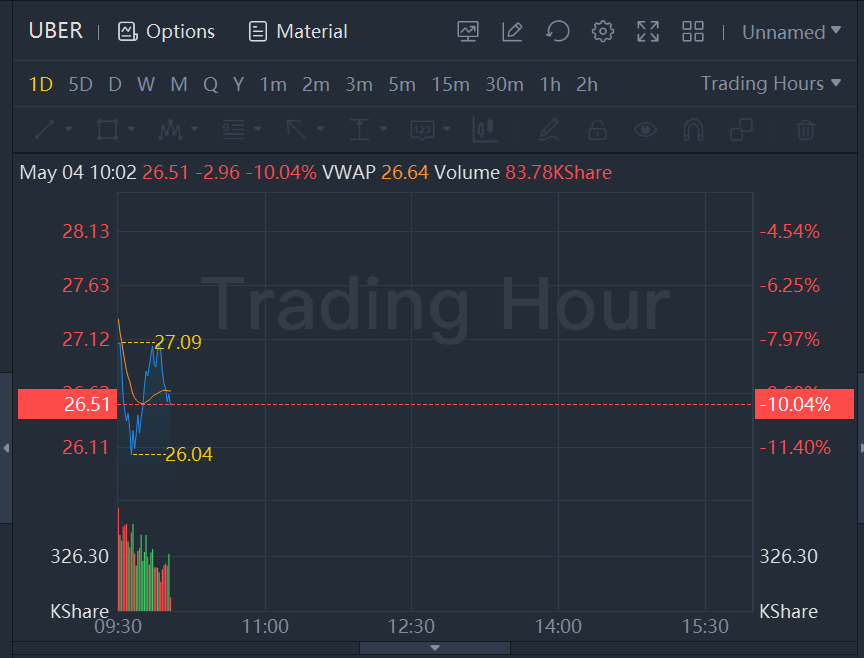Uber Technologies Inc. lost billions of dollars in the first quarter mostly due to its investments, but beat analysts' estimates as it reported results earlier than planned Wednesday morning.
Uber $(UBER)$ shares fell as much as 9% in premarket trading and slumped more than 10% in Morning Trading.
Uber reported a first-quarter net loss of $5.9 billion, or $3.04 a share, compared with a loss of $108 million, or 6 cents a share, in the year-ago period. The company attributed $5.6 billion of that loss to its investments in stakes in Grab Holdings Ltd. (GRAB), Aurora Innovation Inc. $(AUR.AU)$ and Didi Global Inc. $(DIDI)$ The company also said the loss included $359 million in stock-based compensation costs.
Despite the whopping loss, Dara Khosrowshahi, chief executive of the ride-hailing and delivery giant, in a statement touted his company's progress in "navigating out of the pandemic... In April, mobility gross bookings exceeded 2019 levels across all regions and use cases."
On the earnings call, the CEO sought to distance Uber from its competitors, saying the company's positions in rides and delivery give it a distinct advantage. He referred to ride-hailing rival Lyft Inc. $(LYFT)$ announcing Tuesday when it reported results that it intends to spend to attract more drivers to its platform as it prepares for a continued recovery in demand.
"Last night, you heard our competitor leaning into driver supply," Khosrowshahi said. "Our active drivers in the U.S. and Canada were up 70% year over year in April."
Uber was supposed to report results Wednesday after the markets close, but it announced Tuesday night that it would move up its announcement and earnings call to Wednesday morning. Lyft shares were clobbered in extended trading after reporting results Tuesday, weighing on Uber's stock.
See: Lyft stock plunges 26% after forecast, rider numbers come up short
Another way Uber is addressing driver supply is by striking partnerships with the taxi industry that it has decimated. In the U.S. this year, it announced deals to include taxi rides in its app in San Francisco and New York City so far, though Khosrowshahi pointed out that the company has "been at this" for a while in other countries such as Spain and Japan.
"This one for us is a no-brainer," he said on the call. He said there are 4.5 million total Uber earners around the world, and 4 million taxis globally that are "typically under- utilized... Taxis understand we're all in this together."
See: Uber is bringing taxicabs onto its platform, here's how it will work
Uber reported overall gross bookings of $26.45 billion, beating analysts' expectation of $25.96 billion. Mobility, or rides, gross bookings were $10.72 billion, compared with $6.77 billion in the year-ago period. Delivery gross bookings were $13.9 billion, up from $12.46 billion in the first quarter last year. Analysts expected $10.76 billion in rides gross bookings and $13.77 billion in delivery gross bookings.
Revenue more than doubled to $6.85 billion from $2.9 billion in the year-ago quarter.
Adjusted Ebitda was $168 million, exceeding analysts' average estimate of $134 million. That compares with negative adjusted Ebitda of $359 million in the year-ago quarter. Ebitda stands for earnings before interest, taxes, depreciation and amortization; Uber further excludes additional items such as costs associated with stock-based compensation and its response to COVID-19 and more.
Analysts surveyed by FactSet had forecast an adjusted loss of 27 cents a share on revenue of $6.1 billion.
For the second quarter, Uber expects gross bookings of $28.5 billion to $29.5 billion, and adjusted Ebitda of $240 million to $270 million.
Shares of Uber have fallen almost 30% year to date, while the S&P 500 index is down almost 13% so far this year.
-Levi Sumagaysay
$(END)$ Dow Jones Newswires
May 04, 2022 09:39 ET (13:39 GMT)
Copyright (c) 2022 Dow Jones & Company, Inc.

